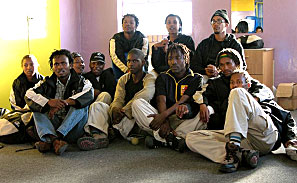groundBREAKERS: breaking new ground in HIV prevention
By Joy Oba
Launched in September 1999, loveLife is one of the largest and most ambitious HIV prevention efforts in the world today. The programme aims to reduce the incidence of HIV among 15 to 20-year-olds in South Africa by at least 50 per cent over the next five years and is a brand-driven, comprehensive national programme targeting 12 to 17-year-olds. It focuses on reducing the negative consequences of premature and adolescent sex by promoting sexual health and healthy lifestyles for young people.
One of the key programme elements of loveLife include a countrywide programme of community-level outreach and support to young people (including 3 500 schools). The outreach programme is led by a national volunteer corps established in 2001, initially consisting of a mere handful of young people, which rapidly expanded to more than 1 000 by the end of 2004. groundBREAKERS are unemployed youth between the ages of 18 and 25, who receive a monthly stipend on a one-year contract. It is a youth development as well as a peer education programme and the core function of the programme is to mobilise young people to effect behaviour change within their communities to live an AIDS-free 'loveLifestyle' and to 'help young South Africans take an active role in reducing the spread of HIV while developing skills to build healthy futures'.
Skills training for volunteers
groundBREAKERS volunteers are drawn from communities across the country and they give one year of service to loveLife. The year includes a 'learnership' development programme of task-specific training in loveLife's HIV prevention initiatives, as well as a structured curriculum of personal and professional skills training. The training will help the groundBREAKERS find work at the end of their involvement with loveLife, either in the private or public sector.
After completing her term of service, one volunteer remarked, 'I feel like a new person. I was just sitting at home and hoping to find a job some day. When I got involved at the Youth Centre, I started working with young people. I’ve developed as a person and can face the world without fear. Now I want to go into business. I want to open a project that will help young people and give them financial empowerment. I also hope to get them some skills training.'
Youth teaching youth
 The Langa Township's loveLife team of 2004. |
VOSESA interviewed the Deputy Director of groundBREAKERS, Denise Hunt, who pointed out that young people are most likely to start changing their behaviour when there is ongoing, sustained face-to-face interaction with them. The loveLife team discovered this through various surveys conducted by the Reproductive Health Research Unit. The research confirmed that the peer education model, where the groundBREAKERS volunteers are used, works better than education by adults. Aside from the youth-teaching-youth model, the age specification is used to offer employment opportunities to people unable to attend higher education.
Hunt said they discovered, after launching the groundBREAKERS programme, that the only way to multiply the efforts of loveLife was through people, so another tier of volunteers who do not receive a stipend was developed. This tier consists of about 5 000 'Mpintshis'. 'Mpintshi' is a township slang word for 'friend, 'mate' or 'helper' and each groundBREAKER has an average of five 'Mpintshis' who work with him/her. 'Mpintshis' are young people, some of them in school, but most of them out of school and unemployed, who are taught to facilitate with the groundBREAKERS. Whatever training the groundBREAKERS get, the 'Mpintshis' get on a slightly different scale.
groundBREAKERS expanded to include rural areas
According to Hunt, research found that about 20 per cent of young people have never heard of loveLife. These young people were concentrated in rural and farmland communities. Based on these findings, and the Department of Social Developments Priority Areas, the groundBREAKERS project expanded to 1 500 participants in June 2005 to include more rural areas in the programme across 250 new sites. When VOSESA contacted Hunt after the initiation of the expansion programme, she said: 'Yes, we are on track with our expansion with the groundBREAKERS programme – this is still keeping us very busy, but we remain excited and are already seeing great results!'
Look out for an outline of the programmes offered to the groundBREAKERS, as well as the preliminary progress reports of its expansion in the next edition of VOSESA Focus.
WATCH THIS SPACE!
Visit the loveLife website at www.lovelife.org.za.